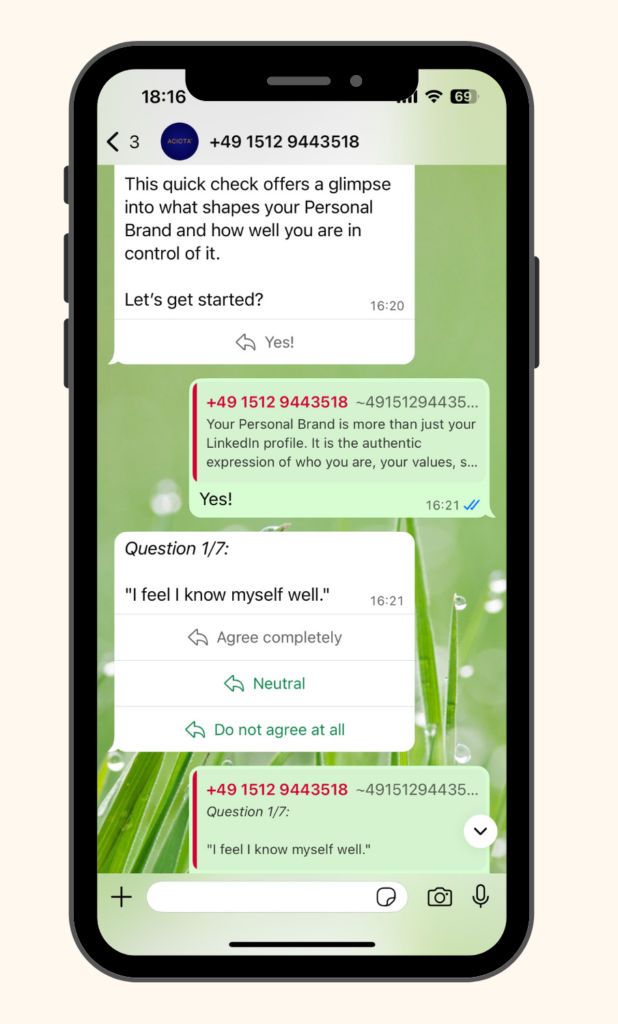Whether scattered across the world, sitting together in the office, or having a hybrid work environment, being a team player is not just a buzzword. Moreover, being a team player does not end when you get promoted; as a professional in a corporate structure, you remain part of a team, whether it is a functional team project or a board of directors. Of course, different settings (functional projects or leadership teams) require different levels of adaptability and leadership qualities. Here, we will review the essential team-player skills you can build over your career to shape your professional image and strengthen your personal brand.
The Importance of Being a Team Player for Your Personal Brand
Your personal brand is how others perceive your value and character. Being approachable yet maintaining gravitas —a concept Caroline Goyder teaches in detail —and delivering your results consistently are the attributes that ensure your career success and leadership visibility. As most of the time your work depends on others and on collaboration with peers, whether from your department or cross-functionally, you reflect your personal brand in every interaction you have. Yet before the internet, in 1997, Tom Peters wrote an article, “The Brand Called You,” in Fast Company journal, where he urged you to be the CEO of Me Inc. and align the way you want to be seen in any interaction you have, in person, over email, phone, etc. These are the exact mediums you use to communicate with colleagues, so making every interaction count ensures your personal brand stays consistent.
Demonstrating strong teamwork skills in every interaction signals that you’re reliable, adaptable, and communicative—all qualities that enhance your reputation. Strong team player skills set you apart in your field and open up opportunities for leadership and career advancement.
Attributes of an Effective Team Player
A team player is someone who actively contributes to group goals, communicates effectively, and supports their colleagues, all while balancing their individual responsibilities. It is a set of skills defined on the one hand as team-level attributes and on the other hand as individual characteristics. Organizational psychology scholars have emphasized that to maintain a reputation as an effective team member and smooth team functioning, you should strive to balance both aspects that overall underline collaboration, adaptability, and reliability. Below, we review each set in detail.
Team-level attributes
On the team level, researchers identify the following skills:
Role clarity and accountability. These are interlinked, as without understanding the task distribution, accountability will be a vague concept. What does it mean for you as an effective team player? First of all, being clear on your own areas of responsibility. When you know precisely what your deliverables are for a given project, it is easier for you to not only set clear, achievable KPIs but also manage your time and your project leader. Furthermore, you will be able to apply various impression management techniques to communicate within the project scope and position yourself as a valuable and indispensable team member.
Goal Alignment & Shared Vision. Apart from knowing what you are responsible for and standing on top of your deliverables, every successful (and career-strategic) team member should understand how their deliverables fit into the overall project vision. Knowing this will help you position your KPIs within the company’s objectives and enable compelling storytelling when presenting your progress. Hence, not only are your goals important to you, but also the team’s goal clarity and strategic direction should be on your radar throughout any project.
Individual characteristics
When it comes to the individual characteristics of a successful team player, the list is broader and covers not only one’s personality traits but also the human capital you possess.
Here is the complete list of the individual characteristics of a successful team player. The first items may seem rather obvious, but we encourage you to read the entire list. We guarantee that some entries may surprise you, as you might not realize they also count towards the total:
Communication & Interpersonal Skills that include conflict management, relationship building, and effective communication. At any time during the project, disagreements are inevitable, whether you are right or your colleague. Going through such disputes is a skill in itself. Becoming emotional about setbacks would position you as an entry-level professional who has yet to master effective communication; maintaining your cool shows you are ready for the next level of promotion. Moreover, every disagreement is an invitation to build even stronger professional relationships, which you don’t want to miss out on.
Collaborative Mindset embodies solidarity, collective decision-making, mentoring, and co-construction of leadership —a collaborative approach in which leadership emerges through shared interactions and mutual influence among team members, rather than being imposed by a single designated leader. So even if you do have a project leader, as every project often does, you can create co-leadership if you approach teamwork with a collaborative mindset beyond your immediate set of responsibilities. Morgan, in his book “The Pirate Inside,” refers to it as Binding. In this case, Binding is forging strong contracts—formal or informal—within teams, centered on shared purpose and clear roles. Building yourself as a productive team member means actively creating unity and a sense of joint ownership in a project’s mission. Hence, being on top of your own deliverables (as in the role clarity above) and being open to what is happening within the project itself shows your open-mindedness, which is a valuable trait of a leader.
Adaptability & Diversity Appreciation, including openness to diversity, flexibility, and a learning attitude. Not only do you have various tasks, but you also have team members representing different cultures and often different opinions. The more adaptable and open you are to varying points of view and feedback, the more others will gravitate towards you. This does not mean saying yes to every member’s suggestion, but it does mean being open to hearing it out with an open mind. Schulze & Krumm (2017), in their article “The ‘virtual team player’,” outline how paramount adaptability is for remote teams. Adaptability is also one of the pillars of a personal brand. Find out how strong these skills are for you here.
Commitment & Motivation as commitment to goals, motivation, and psychological safety. Once you know the team goals (see above), you are able to build commitment by regularly reflecting on your team’s objectives and reminding yourself why they matter. On the other hand, this also aids self-motivation, as motivation is not always a constant. Intrinsic motivation – the one that actually sustainably moves the needle – grows when you celebrate small wins and know how the team goals reflect on your own career. Staying engaged with your teammates is another extravertive aspect you should not miss out on, especially in a remote setting. Such engagement fosters social exchange and overall makes the work more fun (wouldn’t we all want a bit more fun in our jobs?!). When you know you can talk to your peers, psychological safety rises, and you get to practice active listening and overall networking with colleagues. Vice versa, when your team members feel your appreciation for their input, this helps everyone feel comfortable sharing ideas and asking questions. Wouldn’t you want to be known as a great listener?
Knowledge, Skills, and Abilities as technical and professional knowledge, skills, cognitive abilities, and experience. Everyone is unique with their own set of skills and experiences. When you join a project, you bring your authentic self with you—most of the time, this is how people are actually chosen for a particular project. So, to be a true contributor to the project, you want to make sure you have something valuable to offer, whether it’s specialized technical knowledge, prior experience in a similar area, or an ability no one else has (maybe you can count primes in your head like Gaal Dornick in Foundation on Apple TV!). Moreover, during the project, you can keep fostering further knowledge by staying curious and open to learning (on your own and from peers), regularly upgrading your technical know-how, practicing both hard and soft skills, tackling challenges that stretch your critical thinking, and seizing every opportunity—from collaborating on projects to mentoring peers. As you can see, there are abundant options to gain more valuable experience. It’s all about keeping a positive attitude, as it is one of the main characteristics that attracts others to you like a magnet.
Social Capital as relationship networks, influence, and upward leadership. Yes, you were selected for the project for your knowledge, skills, and abilities, but another critical aspect often gets overlooked. Say you are on the PR project that aims to enhance the employer branding of your company, and you happen to be the one with all the contacts from local newspapers. Here is an example of a relationship network you possess and that counts as your Human Capital. Moreover, you can be selected for the project because you have strong leadership skills, including the ability to influence others, which is highly relevant to cross-functional projects. When you are presentable and confident in your abilities—portraying self-efficacy—you are seen as influential and ready to take on more tasks on the project, which could also include mentoring others and influencing superiors, such as your manager or other leaders.
Employers increasingly look for candidates who demonstrate these skills, as they are crucial for maintaining a positive professional environment.
Interview Questions that Assess You as a Team Player
Even before the interview, having “team player” on the resume might be a good option. While simply stating “team player” might seem vague, highlighting your teamwork skills through examples and accomplishments is more effective. Emphasize your contributions to projects, collaboration outcomes, and feedback from colleagues or managers. Ask your contact to give you reference on platforms like LinkedIn to boost your credibility beyond the resume. This approach better communicates your team player skills and enhances your personal brand.
Once you are invited for an interview, it is always beneficial to understand in detail what the position involves and how much interaction or independence is required. For example, will you mainly work alone or collaborate with a team? Is the position remote, office-based, or hybrid? Clarifying these aspects beforehand can help you prepare more effectively for the interview. You can tailor your responses to highlight experiences that are most relevant to the job’s requirements and give specific examples that resonate with the work environment you’ll be joining. But to help you prepare for the actual interview, you can safely expect this set of questions:
-
Can you give an example of when you worked successfully as part of a team?
-
How do you handle conflicts in teamwork?
-
Can you work independently as well as in a team?
-
Describe a time when you helped a teammate overcome a challenge or difficulty.
-
How do you ensure effective communication within a team?
-
Can you share an experience where you contributed to a group’s success?
-
What strategies do you use to build trust among team members?
-
Give an example of how you handle differences of opinion when working in a remote group.
You don’t need a story for every interview question, but having a few versatile stories prepared will significantly boost your confidence and composure. These stories should be flexible enough to fit various types of questions. When answering a specific question, focus on aspects of your story that are most relevant. For example, if you’re asked about handling conflict at work, you could choose a story from a remote project and either highlight how you managed interpersonal issues or discuss the unique challenges of remote collaboration, depending on what the interviewer is looking for. Practicing this strategy helps ensure your stories are clear, intentional, and tailored to the question, making your answers more engaging and effective. Preparing thoughtful responses that showcase both your collaborative abilities and your capacity to work independently will demonstrate a balanced professional image.
Balancing an Image of a Leader and a Team Player
As you saw above, being a team member does not mean you are not a leader. Starting with the co-construction of leadership and influence, you do not have to stay in the shadows of teamwork. In fact, using the project work to advance professionally should be your priority, and contribute to your intrinsic motivation to keep on track. Remember that many promotions happen after a successful project, when a couple of employees get to shine a little more than others. To be among these promoted employees, you must balance being a team player and a leader. This is a thin line and a great balance you will need to navigate throughout the overall project. Emotional intelligence and your self-efficacy would be valuable tools at your disposal to guide and influence others as a leader and to support the team toward shared success as a team player. However, both roles require the ability to work well with others and independently, ensuring your own deliverables are always en pointe.
Team Player Skills for Personal Brand Growth
Not everyone naturally excels at teamwork from the first day, but teamwork skills are learnable. By proactively developing them—such as effective communication, adaptability, and collaboration—you not only build a positive professional image but also enhance your visibility at work. Consistently delivering on your project tasks and demonstrating leadership qualities help shape a personal brand that stands out and attracts new career opportunities. By working on a project, you have a great chance to build a name for yourself, become known as an expert, strengthen relationships with colleagues, and demonstrate your leadership potential. Investing in your team player skills, therefore, is a powerful way to elevate your professional image and ensure your contribution is recognized.






